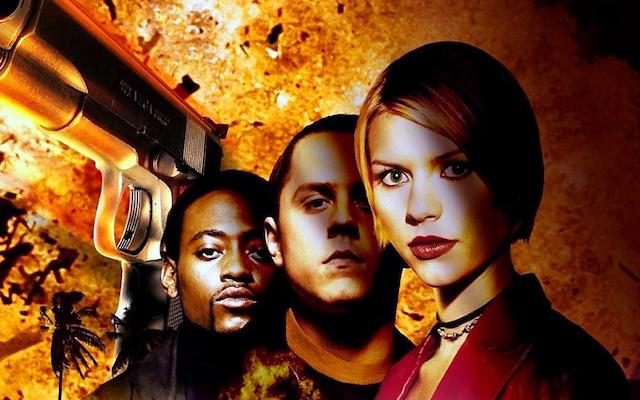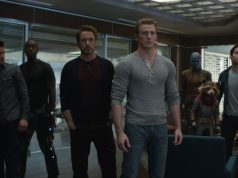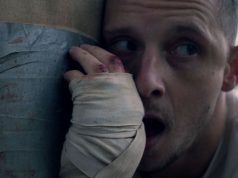
Something that used to happen a lot in the 1990s is that an executive at a movie studio would be rummaging around in the studio’s attic and find an old trunk with some keepsakes in it, and one of these keepsakes would be the legal rights to an old TV show. Then the executive would hurry back downstairs to the boardroom and say, “Hey, everybody! Stop doing cocaine and look at this! We own the rights to this old TV show!” And then they would make a movie out of it, that day.
One day in 1999 the TV show was “The Mod Squad,” a cool crime drama that had aired from 1968 to 1973 and followed the adventures of a cool white dude, a cool black dude, and a cool blonde chick who were young undercover cops who solved cool crimes such as drugs and hippies. The TV show had been popular with young people from 1968 to 1973, but those people were old by the time it got to be 1999, and the new young people didn’t know what “The Mod Squad” was, nor were they fond of pop culture from the early 1970s. But MGM made a “Mod Squad” movie anyway, for reasons that remain mysterious to this day.
It starts out with Dennis Farina, playing a real cop, telling us about the three juvenile delinquents he recruited to be sort-of cops. “This little girl was as hard as they come!” he says of the blonde. He’s talking about Claire Danes, though, so scale back your expectations, hardness-wise. She plays Julie. The other crooks-turned-sort-of-cops are Pete and Linc, played by Giovanni Ribisi and Omar Epps. They’re all pretty belligerent for a trio of punks who are supposed to be in jail. Why aren’t the youth of today (1999) grateful for the second chances they’ve been given? That is the theme of this insightful drama.
Dennis Farina, as Capt. Greer, spends half of his time supervising his three loose-cannon operatives, and the other half apologizing to his superiors for their actions. If the Mod Squad didn’t exist, Capt. Greer would not have anything to do all day. So from an efficiency standpoint, it is just as well that he gets killed pretty early in the movie, thus eliminating his position and reducing government waste.
Greer dies not long after he has assigned his crew to infiltrate a nightclub that’s serving as a front for a prostitution ring. Julie gets a job as a cocktail waitress, and Linc and Pete pose as regular customers who hang around all night and eavesdrop on people’s conversations, trying to gather clues. To the untrained eye, their police work is nearly indiscernible from the behavior of two guys who just go to bars a lot and pick up girls. Trust me, though, they are conducting a serious investigation. Parts of the investigation happen to involve pressing a woman against a wall and making out with her, that’s all.
Julie, Linc, and Pete are the ones who find Greer’s body after he is gunned down in an alley near the bar. Linc says they must flee the scene rather than call the police, as the police would consider them suspects in Greer’s murder. Julie points out that there is no reason to believe the cops would think any such thing, since Greer was their mentor and rescuer and only defender and they had no motive to kill him. But Linc is persistent and convinces the squad to fabricate a fake alibi for where they were when Greer was killed, which of course does make them look guilty. It’s a good thing these three became sort-of cops, because they are not very good at being criminals.
So who did kill Greer? Dirty cops, obviously. In addition to the other generic things that “The Mod Squad” is, it is also the kind of movie where the cops you assume are going to turn out to be dirty are, in fact, dirty. No red herrings here! No reversals, no switcheroos, no bad-seeming-cops-who-turn-out-to-be-decent. This is a helpful tactic for the filmmakers to use, as it enables viewers who get bored and turn the movie off after 30 minutes to still know how it ends.
Meanwhile, in her capacity as fake waitress at the bar, Julie runs into her ex-boyfriend, Billy (Josh Brolin). They used to be alcoholics together, but now they are both sober. They start being lovey-dovey again, which makes Pete jealous, because I guess Pete likes Julie? The movie didn’t mention that before, being so preoccupied with making sure we knew which cops would turn out to be dirty.
Anyway, after dating again for like five minutes, Julie thinks Billy is cheating on her because she calls his house and a WOMAN answers the phone. Everyone knows that if you call a man’s home phone and a lady answers, the man is having sex with that lady, probably right now. So Julie spies on Billy and finds out that nope, he’s not cheating on her: he’s just a pimp. Whew! But he’s also a bad guy, as revealed when he makes a phone call and Julie hears him say, “None of them have any idea that I know they’re cops, especially her!”
While that part of the plot is congealing, Pete and Linc are investigating Greer’s murder. Mostly, though, they’re doing this comedy shtick where Linc loves his car and Pete keeps damaging it. Dumb ol’ Pete even takes the vehicle through a car wash with the top down! Doooh! But just when you think the movie might be an unfunny comedy rather than a dull action flick, Pete and Linc’s informant gets shot and spatters blood on Pete’s face — an event the director shows us three times in rapid succession. Should I be shocked, movie? Should I think that’s cool? Am I supposed to be laughing? Should I be excited? How do you want me to feel? You’re gonna have to tell me, movie. I am not good at guessing what scatterbrained, discordant movies are thinking.
There’s also a part where Pete, upon discovering what’s going on, says, “This is one of those dirty cop drug things? That s*** really happens??” Later he observes, “I feel like one of us should say ‘I’m gettin’ too old for this s***!” and subsequently someone does say that. So the film is aware of cop movie cliches, and halfheartedly comments on them, but in every other instance merely indulges in them. It’s like the movie is smart enough to know that it’s dumb, but too dumb to figure out how to be smarter. (Believe me, I know the feeling.)
Pete really turns out to be the most important character, despite being played by Giovanni Ribisi, who has never been the most important anything. It is Pete who overhears all the bad cops talking in clear, distinct voices about all the crimes they’ve committed, and it is Pete who happens to have a tape recorder with him to capture the entire conversation, even though Pete has never had a tape recorder with him before and would not seem to have any reason to be carrying one. It is possible that Pete is a cartoon character who can reach behind his back and pull whatever he needs out of thin air, be it an anvil, a stick of dynamite, or a tape recorder. For this reason, and despite being quite useless otherwise, Pete is a valuable member of the team.
“The Mod Squad” isn’t the worst of the TV adaptations. It wasn’t even the worst of the TV adaptations that came out in the first three months of 1999 (see also: “My Favorite Martian”), nor the worst Giovanni Ribisi movie from that period (see also: “The Other Sister”). Yet for a movie that isn’t the worst in at least two categories, it sure is dull and tiresome. It feels like a throwaway two-part episode of a TV show that’s in its seventh season and all of the original cast members are gone and you thought it had been canceled but it showed up on the DVR and you were like, “Oh. Huh. All right.” Which probably isn’t what the studio was going for.
— Film.com





